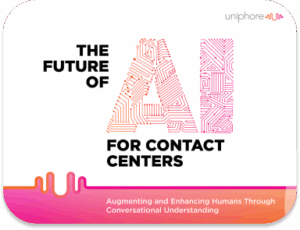 The list of successes in the artificial intelligence (AI) field is quite long, but the way Hollywood has glorified AI has led many to ask, “How close are we?” Although machines remain a long way to truly understanding human language, advances in AI are transforming the world. Sectors such as finance, healthcare, transportation and criminal justice—to name just a few—are deploying AI applications to augment human capabilities in various ways.
The list of successes in the artificial intelligence (AI) field is quite long, but the way Hollywood has glorified AI has led many to ask, “How close are we?” Although machines remain a long way to truly understanding human language, advances in AI are transforming the world. Sectors such as finance, healthcare, transportation and criminal justice—to name just a few—are deploying AI applications to augment human capabilities in various ways.
The supposed slow progress AI is making is largely due to misconceptions surrounding the technology, which we will unpack in this blog post later.
Inside AI Series by Uniphore
 To answer questions and address confusion about AI, we’re launching the Inside AI Series by Uniphore. Every week, we’ll be uploading videos where our VP of AI Patrick Ehlen defines terms frequently used in AI, provides relatable examples and dives deep into how organizations can leverage the opportunities AI offers. The terms discussed are taken from The Future of AI ebook by Uniphore for contact centers.
To answer questions and address confusion about AI, we’re launching the Inside AI Series by Uniphore. Every week, we’ll be uploading videos where our VP of AI Patrick Ehlen defines terms frequently used in AI, provides relatable examples and dives deep into how organizations can leverage the opportunities AI offers. The terms discussed are taken from The Future of AI ebook by Uniphore for contact centers.
This week’s topic, as you may have already guessed, is why AI is harder than we think.
So … Why Is AI Harder Than We Think?
In this video beginning our Inside AI Series, Patrick discusses that with traditional computers, how a computer interacts with a user is pretty predictable. But with AI, we imagine computers in the real world performing advanced tasks like driving with other cars or understanding the intricacies of human language. In reality, a machine can’t understand something it doesn’t know anything about unless it is taught or fed with data that allows it to make its own decisions.
For example, a robot that’s been trained to move around in an empty room will struggle to handle the chaotic situation it discovers if it’s thrown onto a sidewalk. Machines need to learn from their environment before they can adapt to a situation or respond to a problem.
Assumption Fallacies Surrounding AI
Melanie Mitchell, an author and computer scientist at the Santa Fe Institute, has raised four distinct fallacies often associated with AI. These fallacies, according to her, have given AI researchers a skewed sense of the progress that AI has made in the past and where its future is headed.
-
Narrow intelligence is on the same plane as general intelligence: There are many examples of artificial intelligence wins, such as machines achieving victories against human chess and Go world champions. However, these triumphs in narrow areas can’t lead us to assume that we're on the fast track to general AI.
-
Machines are capable of performing simple human activities: Some activities that humans can find difficult, such as playing chess and translating languages, can be easy for machines to learn, while some activities that people find easy, such as climbing the stairs and understanding human speech, are challenging for machines to achieve. Human thought processes are far more complex than we often realize, and machines can’t replicate them without vast amounts of data, context, and training.
-
Program and benchmark labels, usually mnemonics, describe machine intelligence: The inaccurate use of language to describe machine intelligence is a common factor in AI being seen as more superior. For example, the Stanford Question Answering Dataset (SQuAD) compares human and machine answers to a narrow set of questions, which leads to claims that machines are more intelligent than humans.
-
Intelligence is only in our heads: When we think about AI, we typically picture it as a cognitive entity. However, human intelligence is also lived through the arms, legs and muscles that absorb the impact of movement, without the brain’s heavy involvement. From an AI perspective, a machine needs accurate limb and processor measurement to absorb the impact when a robot makes human-like movements.
“AI is harder than we think because we have a limited understanding of the nature and complexity that lies behind intelligence itself.”
Melanie Mitchell, Author and Computer Scientist at the Santa Fe Institute
What’s amazing is despite this limited understanding, humans have made great progress with AI, its impact spanning many industries across the globe. And as we continue to bring clarity to the complex world of AI through research, collaboration, more deployments and some missteps here and there, there is no doubt that AI will carry on changing the world as we know it.